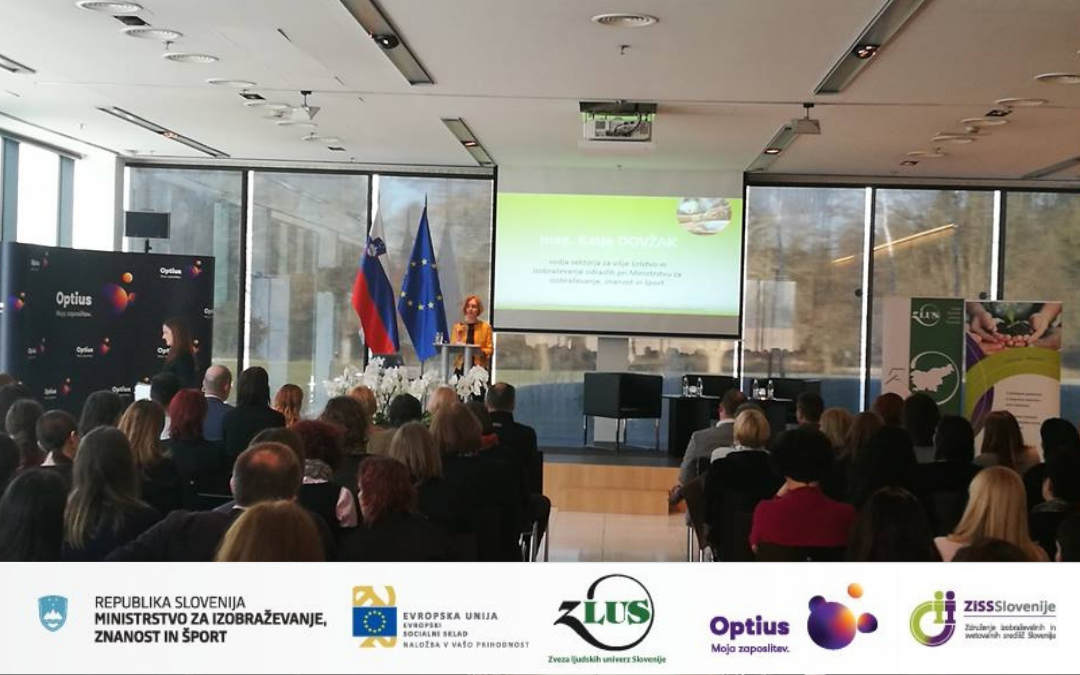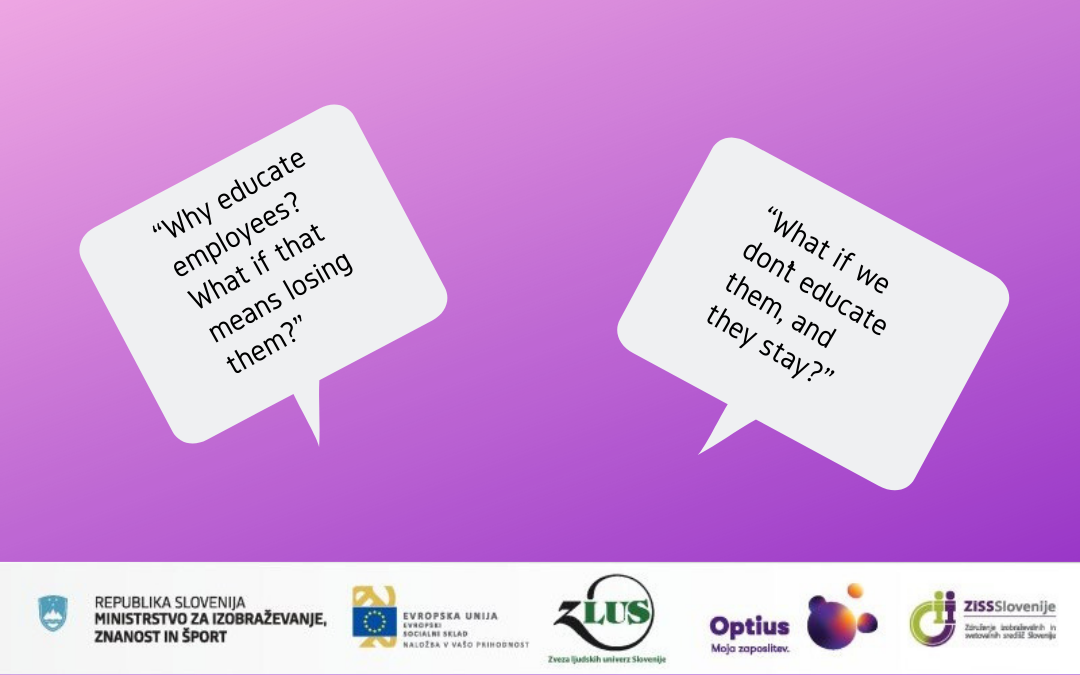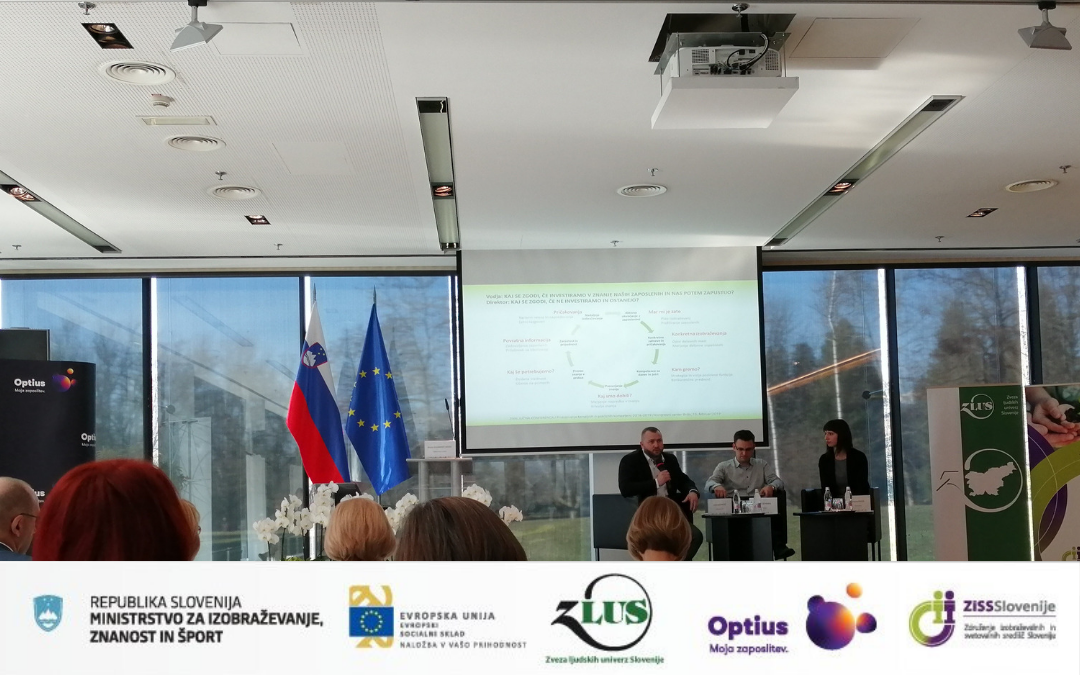In her initial address, Katja Dovžak, MSc, Head of the Higher Vocational and Adult Education Unit at the MESS, praised adult education centres and other adult education providers who contributed in the improvement of basic and professional skills of individuals over 45 who have not obtained more than lower secondary education. Numbers, shares, and other optimistic data, and mainly the carefully selected speakers with interesting and even whimsical performances, contributed to the positive atmosphere at the Closing Conference of Developing Basic and Professional Competences 2016–2019, on 15 February in Brdo pri Kranju. Even when the President of the Chamber of Commerce and Industry of Slovenia, Boštjan Gorjup, challenged the participants with his question about a glass of water, most of the people in the hall turned out to be optimists.
Most importantly, his speech ensured the representatives of schools, adult education centres, and other adult education organisations, that companies need them. That is the only way they can provide more and better engagement with employees, prepare training programmes, and ensure their professional development and motivation. Gorjup emphasised the fact that some competences, such as managerial skills, are not developed during formal education, and trends indicate that in a job, soft skills will soon become as important as professional knowledge.
Laughter from behind the classroom door.
Bojan Hajdinjak, MSc (The Association of Slovenian Adult Education Centres), as well as Biserka Neuholt Hlastec (UPI – Žalec, AEC), emphasised the role of adult education centres that are familiar with the local environment and can adapt their programmes to it. Participant target groups have at least two points in common – poor self-esteem and lack of trust in themselves – which, as we know, can be successfully eliminated through lifelong learning. In Žalec, the employees are guided following the IGAE (ISIO) method and trained as part of the Developing basic and professional competences programme. The project implementers have something in common – it is very hard for them to get closer to companies. The enterprises already have their own culture, which either does or does not include lifelong learning. Numerous doors have opened because the provided education is free, and did no’t close after the first experience. In the end, everyone is satisfied – the employees, because someone is actively engaging with them, and the managers, because they can hear laughter from behind the doors of the classrooms, workshops, and conference rooms.
The employee is king.
Sanda Jerman, project manager at Optius Moja zaposlitev, introduced the term VUCA-environment. Human resources trends indicate that bosses are being replaced by leaders who can work better with employees. Finding committed job candidates is becoming more and more important for companies where the customer comes first, which puts the employees in an increasingly important role in the company. Employees are the ambassadors of the company’s culture and organisation.
Sustainable employability ≠ sustainable employment.
Children born today will work until they are 75. Why not? The Rolling Stones are still working, even though they are all older than 75, and they have around 58 years of work behind them. And they don’t look like they want to retire … Occupational and sports physician, Zdenko Šalda, enhanced his presentation on working longer and sustainable employability with interesting calculations and examples that placed the initial statement into a suitable context. Education and well-being are crucial for sustainable employability. But we should be worried about individuals who are merely sustainably employed.
Zavarovalnica Triglav takes good care of its employees. They encourage formal as well as informal education; in collaboration with a higher professional education institution, they adjusted the insurance module in the economy study programme, which enables students to obtain a higher professional education, with which they helped 150 of their workers to not only get the title, but a higher level of education. The employees are involved in coaching and the implementation of internal training programmes, many of which are conducted online and in individual-friendly forms. They realised that older employees participate less in the education, which is why they introduced a mentorship programme. That is how they ensure intergenerational cooperation. Workers with more experience and years of employment can transfer their knowledge to the younger employees.
From apathy to motivation.
Good practice examples confirm that the Developing basic and professional competences project has justified its purpose. The companies Alpina Žiri, Tik Kobarid, Adria Mobil, and Jesenice General Hospital have experienced positive results. They took on the initiative of local adult education centres and the employees’ stance improved. Since the programmes also function as team building, there was improvement in interpersonal relationships.
The first impression is decisive, but the last impression is lasting.
We are optimistic about the future. The MESS envisages the inclusion of more target groups – including the unemployed – in the new call for tenders. This was welcomed by employee representatives and educators alike. The individuals who have already gained new knowledge, improved their self-esteem, connected amongst themselves, and improved mutual relationships, as well as relations with the management as part of the Developing basic and professional competences programme, all confirm that they not only gained professional competences, but also life skills that improve their personal lives and free time. Many eagerly await new education programmes.
Ana Peklenik (ana.peklenik@acs.si), SIAE




